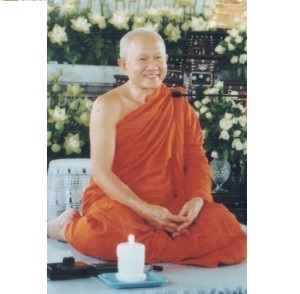Dependent Origination - The Buddhist Law of Conditionality
- Tác giả: Venerable Phra Brahmagunabhorn (P. A. Payutto)
- Chuyên mục: Pháp học
- Trạng thái: Còn trong thư viện
Mô tả sách
Dependent Origination
The Buddhist Law of Conditionality
Tác giả: Vererable Phra Brahmagunabhorn (P. A. Payutto)

The teaching on Dependent Origination has a reputation for being intricate, subtle, and abstruse. When I was a monk, it took me fourteen years to delve into this subject. Until that point I had been content with Vernerable Ajahn Chah's reflection, as found in the recorded talk 'The Key to Liberation':
You have already studied and read about Dependent Origination in the books, and what's set out there is correct as far as it goes, but in reality you're not able to keep up with the process as it actually occurs. It's like falling out of a tree: in a flash, you've fallen all the way from the top of the tree and hit the ground, and you have no idea how many branches you passed on the way down. When the mind experiences a mind-object and is attracted to it, all of a sudden you find yourself experiencing a good mood without being aware of the causes and conditions which led up to it. Of course, on one level the process happens according to the theory described in the scriptures, but at the same time it goes beyond the limitations of the theory. In reality, there are no signs telling you that now it's ignorance, now it's volitional formations, then it's consciousness, now it's mind-and-body, and so on. These scholars who see it like that, don't get the chance to read out the list as the process is taking place. Although the Buddha analyzed one moment of consciousness and described all the different component parts, to me it's more like falling out of a tree - everything happens so fast you don't have time to reckon how far you've fallen and where you are at any given moment. What you know is that you've hit the ground with a thud, and it hurts!
When I did begin to study this teaching in more detail I had the good fortune of reading Bruce Evan's translation of chapter 4 of Buddhadhamma, by Ven. Ajahn Payutto (Tahn Chao Khun Bramagunabhorn). Since then many people have mentioned how useful this translation has been for their spiritual practice. My preceptor, Ven. Ajahn Sumedho, has repeatedly said that he finds this book the best presentation of Dependent Origination in English, and he has wondered when it may be reprinted.
As part of the project to translate Buddhadhamma in its entirely, I knew that at some point within the next two years I would be tackling this subject and preparing a new translation of this chapter. However, knowing that this chapter is the most difficult of all the twenty-two chapters in the book, I was happy to leave it for later. It happened, though, that Khun Sirichan Bhirombhakdi made a request last year to sponsor one more book (following the two previous volumes, 'The Three Signs' and 'Nibbāna: The Supreme Peace'), and Dependent Origination was the chapter of her choice. Therefore, this book has come into being sooner than planned.
Characteristic to his inclusive and integrative style, Ajahn Payutto has based this explanation of Dependent Origination on sources in the Pali suttas, and then woven in references from the Abhidhamma and the commentaries to present a complementary whole.
My thoughts of gratitude and deep respect go primarily to Ven. Ajahn Payutto. Besides remaining a beacon of wisdom and compassion, and continuing to entrust this translation project to my hands, he has repeatedly and promptly answered my questions and doubts about the translation work, despite him being burdened by a debilitating physical illness.
Second, my gratitude goes to Ven. Ajahn Jayasaro, who spent literally days going over the manuscript of this book with me in great detail. His insights, suggestions and corrections have been invaluable. Although he knew that there was a time pressure to try and finish this book before the Wesak celebration, he would not settle for anything less than accuracy and excellence.
Finally, I extend gratitude to Ven. Gavesako, who with his eruditon and eagle eyes helped to proofread the manuscript.
Unless otherwise stated, the footnotes are by the translator. The endnotes are part of the original text. The numbers in brackets within the main text refer to the page number of the Thai original.
May all beings who approach this doorway to the Dhamma realize perfect peace.
Robin Moore
Kensington Place
April 2011

/cover.jpg&output=webp&w=350)
/1.jpg&output=webp&w=350)
/2.jpg&output=webp&w=350)
/3.jpg&output=webp&w=350)
/4.jpg&output=webp&w=350)



